Boosting Cognitive Development in Autism: The Role of Sensory Toys
July 8, 2024
Boosting Cognitive Development in Autism: The Role of Sensory Toys

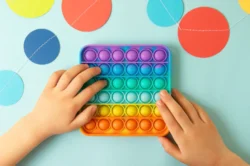
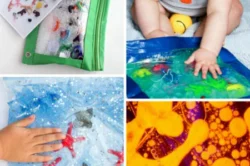
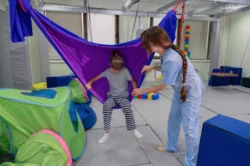
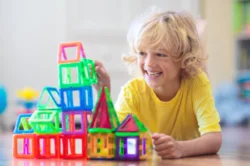
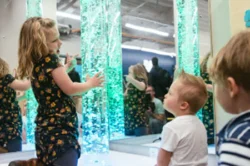

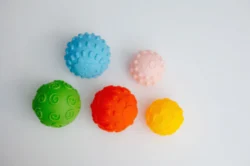
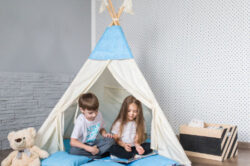
Separation anxiety can feel overwhelming—for both children and parents. For families of children with special needs, the challenges can become
Sensory Integration Therapy (SIT) has emerged as a powerful tool for children and adults facing sensory processing difficulties. Often seen
Sensory diets can be powerful tools for supporting children with Sensory Processing Disorder (SPD). But what exactly is a sensory
Why does my child cover their ears at birthday parties? Why do the seams on socks cause meltdowns, or loud
How are anxiety and sensory processing challenges related, especially in children? Many parents and professionals notice that children with Sensory
Raising a child with dyslexia can feel overwhelming at times, but it’s important to remember that you are not alone.
Independence is an essential milestone in the development of any child, and for children with special needs, it holds even
Attention-Deficit/Hyperactivity Disorder (ADHD) is a common neurodevelopmental condition that often manifests in early childhood. For parents, recognizing the signs of
Occupational therapy (OT) plays a vital role in supporting children with autism as they develop the skills needed to engage
Sensory play is much more than just fun—it’s a powerful tool for fostering your child’s development across multiple domains. From
Sensory play is an unparalleled tool in fostering childhood development. By engaging the senses—be it touch, sight, hearing, smell, taste,
Sensory Processing Disorder (SPD) affects how individuals interpret and respond to sensory input from the environment. For those who experience
Separation anxiety can feel overwhelming—for both children and parents. For families of children with special needs, the challenges can become
Supporting kids with ADHD takes more than reminders and patience. For parents and educators, understanding ADHD and providing the right
Attention Deficit Hyperactivity Disorder (ADHD) and Sensory Processing Disorder (SPD) are two conditions frequently discussed in pediatric development and mental
Sensory overload occurs when one or more of the body's senses become overstimulated by external stimuli. For individuals affected, this
Raising a child with ADHD (Attention-Deficit/Hyperactivity Disorder) presents unique challenges, requiring patience, understanding, and adaptability. However, with the right strategies
Sensory diets are systematic and individualized strategies that help modify or meet sensory needs, particularly benefiting children and adults with
Parents, educators, and therapists often face a perplexing challenge when trying to distinguish between Sensory Processing Disorder (SPD) and Attention
25 Sensory Activities and Exercises for Kids with Sensory Processing Disorder and ADHD If your child has Sensory Processing Disorder
Children with Attention-deficit/hyperactivity disorder (ADHD) and Autism Spectrum Disorders (ASD) face difficulties in regulating their emotions and sensory input from
How Sensory Toys Help with ADHD: A Detailed Guide If you are a parent of a child with ADHD or
Managing Toddler ADHD Symptoms: A Parent’s Guide ADHD (Attention Deficit Hyperactivity Disorder) in toddlers can present a unique set of
Autism and Sensory Disorders: Therapeutic Impact of Sensory Toys As a parent or caregiver of a child with Autism Spectrum
Separation anxiety can feel overwhelming—for both children and parents. For families of children with special needs, the challenges can become
Separation anxiety can be tough on any child, but for children with special needs, it often goes hand in hand
Sensory processing disorder (SPD) often flies under the radar, yet it plays a crucial role in understanding the complexities of
Sensory overload occurs when one or more of the body's senses become overstimulated by external stimuli. For individuals affected, this
Sensory diets are systematic and individualized strategies that help modify or meet sensory needs, particularly benefiting children and adults with
“It takes a village to raise a child. It takes a child with autism to raise the consciousness of the
Dealing with autism meltdowns can be a challenging experience for caregivers, teachers, and those on the spectrum alike. A meltdown
Understanding Autism Regression in Children What is Autism Regression? Autism spectrum disorder (ASD) is marked by a range of symptoms
Autism and Sensory Disorders: Therapeutic Impact of Sensory Toys As a parent or caregiver of a child with Autism Spectrum
How Sensory Toys Facilitate Learning for Children with Autism Autism Spectrum Disorder (ASD) affects approximately 1 in 54 children in
Uniting Communities: Online Support and Resources for Autism, SPD, and ADHD Navigating neurodiversity can be a complex and sometimes isolating
Have you or a loved one received a diagnosis and now are having a long wait time to find answers
Separation anxiety can feel overwhelming—for both children and parents. For families of children with special needs, the challenges can become
Separation anxiety can be tough on any child, but for children with special needs, it often goes hand in hand
Picture this scene: You’ve finally gotten your baby into a comfortable sleep routine. Nights are restful, naps are scheduled, and
Sleep regressions can feel like an uphill battle for parents. One moment your baby is sleeping soundly, and the next,
Sleep regressions are a temporary yet challenging phase many parents encounter as their babies and toddlers grow. Understanding the approximate
Sleep regressions. The phrase alone can strike fear into the hearts of even the most seasoned parents. If your baby
Sleep regressions can feel like a relentless obstacle to parents striving for a peaceful night's rest. But you're not alone,
Supporting kids with ADHD takes more than reminders and patience. For parents and educators, understanding ADHD and providing the right
Sensory Integration Therapy (SIT) has emerged as a powerful tool for children and adults facing sensory processing difficulties. Often seen
Sensory diets can be powerful tools for supporting children with Sensory Processing Disorder (SPD). But what exactly is a sensory
Why does my child cover their ears at birthday parties? Why do the seams on socks cause meltdowns, or loud
How are anxiety and sensory processing challenges related, especially in children? Many parents and professionals notice that children with Sensory
Separation anxiety can feel overwhelming—for both children and parents. For families of children with special needs, the challenges can become
Picture this scene: You’ve finally gotten your baby into a comfortable sleep routine. Nights are restful, naps are scheduled, and
Sleep regressions can feel like an uphill battle for parents. One moment your baby is sleeping soundly, and the next,
Sleep regressions are a temporary yet challenging phase many parents encounter as their babies and toddlers grow. Understanding the approximate
Sleep regressions. The phrase alone can strike fear into the hearts of even the most seasoned parents. If your baby
Sleep regressions can feel like a relentless obstacle to parents striving for a peaceful night's rest. But you're not alone,
Supporting kids with ADHD takes more than reminders and patience. For parents and educators, understanding ADHD and providing the right
Sensory Integration Therapy (SIT) has emerged as a powerful tool for children and adults facing sensory processing difficulties. Often seen
Sensory diets can be powerful tools for supporting children with Sensory Processing Disorder (SPD). But what exactly is a sensory
Why does my child cover their ears at birthday parties? Why do the seams on socks cause meltdowns, or loud
How are anxiety and sensory processing challenges related, especially in children? Many parents and professionals notice that children with Sensory
When your child struggles with writing, it's easy to assume they just need practice or a little more time to
Picture this scene: You’ve finally gotten your baby into a comfortable sleep routine. Nights are restful, naps are scheduled, and
Sleep regressions can feel like an uphill battle for parents. One moment your baby is sleeping soundly, and the next,
Sleep regressions are a temporary yet challenging phase many parents encounter as their babies and toddlers grow. Understanding the approximate
Sleep regressions. The phrase alone can strike fear into the hearts of even the most seasoned parents. If your baby
Sleep regressions can feel like a relentless obstacle to parents striving for a peaceful night's rest. But you're not alone,
Supporting kids with ADHD takes more than reminders and patience. For parents and educators, understanding ADHD and providing the right
Sensory Integration Therapy (SIT) has emerged as a powerful tool for children and adults facing sensory processing difficulties. Often seen
Sensory diets can be powerful tools for supporting children with Sensory Processing Disorder (SPD). But what exactly is a sensory
Why does my child cover their ears at birthday parties? Why do the seams on socks cause meltdowns, or loud
How are anxiety and sensory processing challenges related, especially in children? Many parents and professionals notice that children with Sensory
Physical therapy plays an essential role in helping children achieve the developmental milestones necessary for functional independence, confidence, and overall
Anxiety is a natural emotion, but when it begins to interfere with a child’s everyday activities, it becomes a cause
Because staying in the loop is important
Author: DrSensory Team
July 8, 2024
Autism Spectrum Disorder (ASD) affects approximately 1 in 54 children in the United States, according to the Centers for Disease Control and Prevention (CDC). Children with ASD often experience difficulties with communication, social interaction, and repetitive behaviors. They may also have sensory processing issues, which means they may experience heightened sensitivity or under-responsiveness to certain stimuli such as light, noise, touch, or smell.
Sensory toys are designed to stimulate the senses and provide a supportive and calming environment for children with ASD. They can help improve their communication and social skills, increase their focus and attention, and reduce anxiety. In this blog post, we will discuss how sensory toys facilitate learning for children with autism.

One type of sensory toy that is gaining popularity is weighted blankets. These blankets are filled with weighted materials that create deep pressure on the body, which can help children with ASD relax and self-regulate. According to research, weighted blankets can also improve sleep quality and reduce anxiety levels in children with Autism (Wietecha, 2016).
Another type of sensory toy that has recently been discovered to aid in cognitive development is music therapy. Music therapy has been found to improve communication and socialization in children with Autism, as well as increase attention span and language development (Geretsegger et al., 2017). Musical instruments such as drums, tambourines, and xylophones can provide children with a sense of rhythm and control, which can translate into improved motor skills.

Fidget toys have become increasingly popular in recent years, especially in schools. Fidget toys help children with Autism focus and improve attention span. These toys range from stress balls to fidget spinners, and they can be used to relieve anxiety and increase alertness. These benefits allow a child to focus on exploring and learning from our world and the environment around us.

Another sensory tool that can assist with sensory processing difficulties is a sensory bag. Sensory bags can contain a variety of objects and materials, such as beads, sand, and water. Children can squeeze, push, pinch, and hold the bag to feel different textures and pressure on their hands. Sensory bags are easy to assemble and can be customized to suit a specific child’s needs.

Sensory swings can also assist children with ASD. Swinging can provide a calming and relaxing effect via rhythmic movement. The gentle repetitive movement can help children with sensory processing difficulties regulate their senses. For example, some children with autism may have increased anxiety levels – something that can be regulated to some extent by the rhythmic swinging affect of sensory swings. A benefit of sensory swings is that they can be used both indoors and outdoors, creating a variety of different environments that can be explored.

Another sensory toy that can assist in developing cognitive skills is magnetic blocks. Magnetic blocks can help with problem-solving, spatial awareness, and creativity. Children can build structures and designs using the blocks, which can improve visual-spatial skills and hand-eye coordination while also fostering imagination and creativity. Magnetic blocks are a popular sensory toy for children with Autism, as they provide a calming effect and are easy to manipulate.

Bubble tubes or sensory bubble walls can also be used to promote relaxation and sensory processing. Bubble tubes provide visual stimulation and can aid in calming children with sensory processing difficulties. Research has shown that sensory bubble tubes can help reduce distress in pediatric patients, including those with Autism.

Visual aids, such as light boxes or LED light panels, can also assist children with Autism in developing cognitive skills. Light boxes can promote attention to detail, visual organization, and fine motor skills. The vibrancy and brightness of LED light panels can improve visual stimulation and perception. These visual aids can be used in therapy sessions or at home, in a calming and peaceful environment. Keep in mind that different sensory techniques are varied for each child – not all children will benefit from bright lights.

Sensory balls are another popular toy for children with Autism. These toys can provide a tactile experience and improve sensory-motor development by allowing a child to choose how they play. Sensory balls can be used for a range of activities, such as squeezing, simply holding/exploring, tossing, and throwing. They are easy to manipulate and can be used to reduce anxiety and stress.

Sensory tents or dens can also be used as comforting spaces for children with Autism. These tents can provide a quiet and peaceful environment for children to relax and self-regulate. Sensory tents can be set up in a child’s bedroom or classroom, and they can be customized with sensory toys and materials.
In conclusion, sensory toys and tools can play a significant role in enhancing cognitive development in children with Autism. Sensory toys provide the necessary stimulation and comfort that children with ASD need. These toys are designed to manage sensory processing difficulties and create a calming and soothing environment. By utilizing sensory play in a variety of different ways specific for each child, we can help all children reach a higher cognitive potential and increase their ability of thriving in our world today.
Separation anxiety can feel overwhelming—for both children and parents. For families of children with special needs, the challenges can become
Separation anxiety can be tough on any child, but for children with special needs, it often goes hand in hand
Picture this scene: You’ve finally gotten your baby into a comfortable sleep routine. Nights are restful, naps are scheduled, and
Sleep regressions can feel like an uphill battle for parents. One moment your baby is sleeping soundly, and the next,
Sleep regressions are a temporary yet challenging phase many parents encounter as their babies and toddlers grow. Understanding the approximate
Separation anxiety can feel overwhelming—for both children and parents. For families of children with special needs, the challenges can become
Sensory Integration Therapy (SIT) has emerged as a powerful tool for children and adults facing sensory processing difficulties. Often seen
Sensory diets can be powerful tools for supporting children with Sensory Processing Disorder (SPD). But what exactly is a sensory
Why does my child cover their ears at birthday parties? Why do the seams on socks cause meltdowns, or loud
How are anxiety and sensory processing challenges related, especially in children? Many parents and professionals notice that children with Sensory
Attention-Deficit/Hyperactivity Disorder (ADHD) is a common neurodevelopmental condition that often manifests in early childhood. For parents, recognizing the signs of
Sensory play is much more than just fun—it’s a powerful tool for fostering your child’s development across multiple domains. From
Sensory play is an unparalleled tool in fostering childhood development. By engaging the senses—be it touch, sight, hearing, smell, taste,
The neurological and psychological study of autism spectrum conditions has evolved significantly over the decades, and with it, so have
Sensory Processing Disorder (SPD) affects the way children interpret and respond to sensory information from the world around them. Unlike
When most people think about the senses, the traditional five often come to mind: sight, sound, taste, touch, and smell.
Sensory processing disorder (SPD) often flies under the radar, yet it plays a crucial role in understanding the complexities of
Separation anxiety can feel overwhelming—for both children and parents. For families of children with special needs, the challenges can become
Supporting kids with ADHD takes more than reminders and patience. For parents and educators, understanding ADHD and providing the right
Attention Deficit Hyperactivity Disorder (ADHD) and Sensory Processing Disorder (SPD) are two conditions frequently discussed in pediatric development and mental
Sensory overload occurs when one or more of the body's senses become overstimulated by external stimuli. For individuals affected, this
Raising a child with ADHD (Attention-Deficit/Hyperactivity Disorder) presents unique challenges, requiring patience, understanding, and adaptability. However, with the right strategies
Sensory diets are systematic and individualized strategies that help modify or meet sensory needs, particularly benefiting children and adults with
25 Sensory Activities and Exercises for Kids with Sensory Processing Disorder and ADHD If your child has Sensory Processing Disorder
How Sensory Toys Help with ADHD: A Detailed Guide If you are a parent of a child with ADHD or
Managing Toddler ADHD Symptoms: A Parent’s Guide ADHD (Attention Deficit Hyperactivity Disorder) in toddlers can present a unique set of
Autism and Sensory Disorders: Therapeutic Impact of Sensory Toys As a parent or caregiver of a child with Autism Spectrum
Uniting Communities: Online Support and Resources for Autism, SPD, and ADHD Navigating neurodiversity can be a complex and sometimes isolating
Have you or a loved one received a diagnosis and now are having a long wait time to find answers
Separation anxiety can feel overwhelming—for both children and parents. For families of children with special needs, the challenges can become
Separation anxiety can be tough on any child, but for children with special needs, it often goes hand in hand
Sensory processing disorder (SPD) often flies under the radar, yet it plays a crucial role in understanding the complexities of
Sensory overload occurs when one or more of the body's senses become overstimulated by external stimuli. For individuals affected, this
Sensory diets are systematic and individualized strategies that help modify or meet sensory needs, particularly benefiting children and adults with
“It takes a village to raise a child. It takes a child with autism to raise the consciousness of the
Dealing with autism meltdowns can be a challenging experience for caregivers, teachers, and those on the spectrum alike. A meltdown
Understanding Autism Regression in Children What is Autism Regression? Autism spectrum disorder (ASD) is marked by a range of symptoms
Autism and Sensory Disorders: Therapeutic Impact of Sensory Toys As a parent or caregiver of a child with Autism Spectrum
How Sensory Toys Facilitate Learning for Children with Autism Autism Spectrum Disorder (ASD) affects approximately 1 in 54 children in
Uniting Communities: Online Support and Resources for Autism, SPD, and ADHD Navigating neurodiversity can be a complex and sometimes isolating
Have you or a loved one received a diagnosis and now are having a long wait time to find answers
Separation anxiety can feel overwhelming—for both children and parents. For families of children with special needs, the challenges can become
Separation anxiety can be tough on any child, but for children with special needs, it often goes hand in hand
Picture this scene: You’ve finally gotten your baby into a comfortable sleep routine. Nights are restful, naps are scheduled, and
Sleep regressions can feel like an uphill battle for parents. One moment your baby is sleeping soundly, and the next,
Sleep regressions are a temporary yet challenging phase many parents encounter as their babies and toddlers grow. Understanding the approximate
Sleep regressions. The phrase alone can strike fear into the hearts of even the most seasoned parents. If your baby
Sleep regressions can feel like a relentless obstacle to parents striving for a peaceful night's rest. But you're not alone,
Supporting kids with ADHD takes more than reminders and patience. For parents and educators, understanding ADHD and providing the right
Sensory Integration Therapy (SIT) has emerged as a powerful tool for children and adults facing sensory processing difficulties. Often seen
Sensory diets can be powerful tools for supporting children with Sensory Processing Disorder (SPD). But what exactly is a sensory
Why does my child cover their ears at birthday parties? Why do the seams on socks cause meltdowns, or loud
How are anxiety and sensory processing challenges related, especially in children? Many parents and professionals notice that children with Sensory
Separation anxiety can feel overwhelming—for both children and parents. For families of children with special needs, the challenges can become
Picture this scene: You’ve finally gotten your baby into a comfortable sleep routine. Nights are restful, naps are scheduled, and
Sleep regressions can feel like an uphill battle for parents. One moment your baby is sleeping soundly, and the next,
Sleep regressions are a temporary yet challenging phase many parents encounter as their babies and toddlers grow. Understanding the approximate
Sleep regressions. The phrase alone can strike fear into the hearts of even the most seasoned parents. If your baby
Sleep regressions can feel like a relentless obstacle to parents striving for a peaceful night's rest. But you're not alone,
Supporting kids with ADHD takes more than reminders and patience. For parents and educators, understanding ADHD and providing the right
Sensory Integration Therapy (SIT) has emerged as a powerful tool for children and adults facing sensory processing difficulties. Often seen
Sensory diets can be powerful tools for supporting children with Sensory Processing Disorder (SPD). But what exactly is a sensory
Why does my child cover their ears at birthday parties? Why do the seams on socks cause meltdowns, or loud
How are anxiety and sensory processing challenges related, especially in children? Many parents and professionals notice that children with Sensory
Anxiety is a natural emotion, but when it begins to interfere with a child’s everyday activities, it becomes a cause
Picture this scene: You’ve finally gotten your baby into a comfortable sleep routine. Nights are restful, naps are scheduled, and
Sleep regressions can feel like an uphill battle for parents. One moment your baby is sleeping soundly, and the next,
Sleep regressions are a temporary yet challenging phase many parents encounter as their babies and toddlers grow. Understanding the approximate
Sleep regressions. The phrase alone can strike fear into the hearts of even the most seasoned parents. If your baby
Sleep regressions can feel like a relentless obstacle to parents striving for a peaceful night's rest. But you're not alone,
Supporting kids with ADHD takes more than reminders and patience. For parents and educators, understanding ADHD and providing the right
Sensory Integration Therapy (SIT) has emerged as a powerful tool for children and adults facing sensory processing difficulties. Often seen
Sensory diets can be powerful tools for supporting children with Sensory Processing Disorder (SPD). But what exactly is a sensory
Why does my child cover their ears at birthday parties? Why do the seams on socks cause meltdowns, or loud
How are anxiety and sensory processing challenges related, especially in children? Many parents and professionals notice that children with Sensory
Anxiety is a natural emotion, but when it begins to interfere with a child’s everyday activities, it becomes a cause
Attention-Deficit/Hyperactivity Disorder (ADHD) is a common neurodevelopmental condition that often manifests in early childhood. For parents, recognizing the signs of
Because staying in the loop is important
Fill out the form below, and we’ll be in touch shortly.
Join thousands of parents and educators each week


